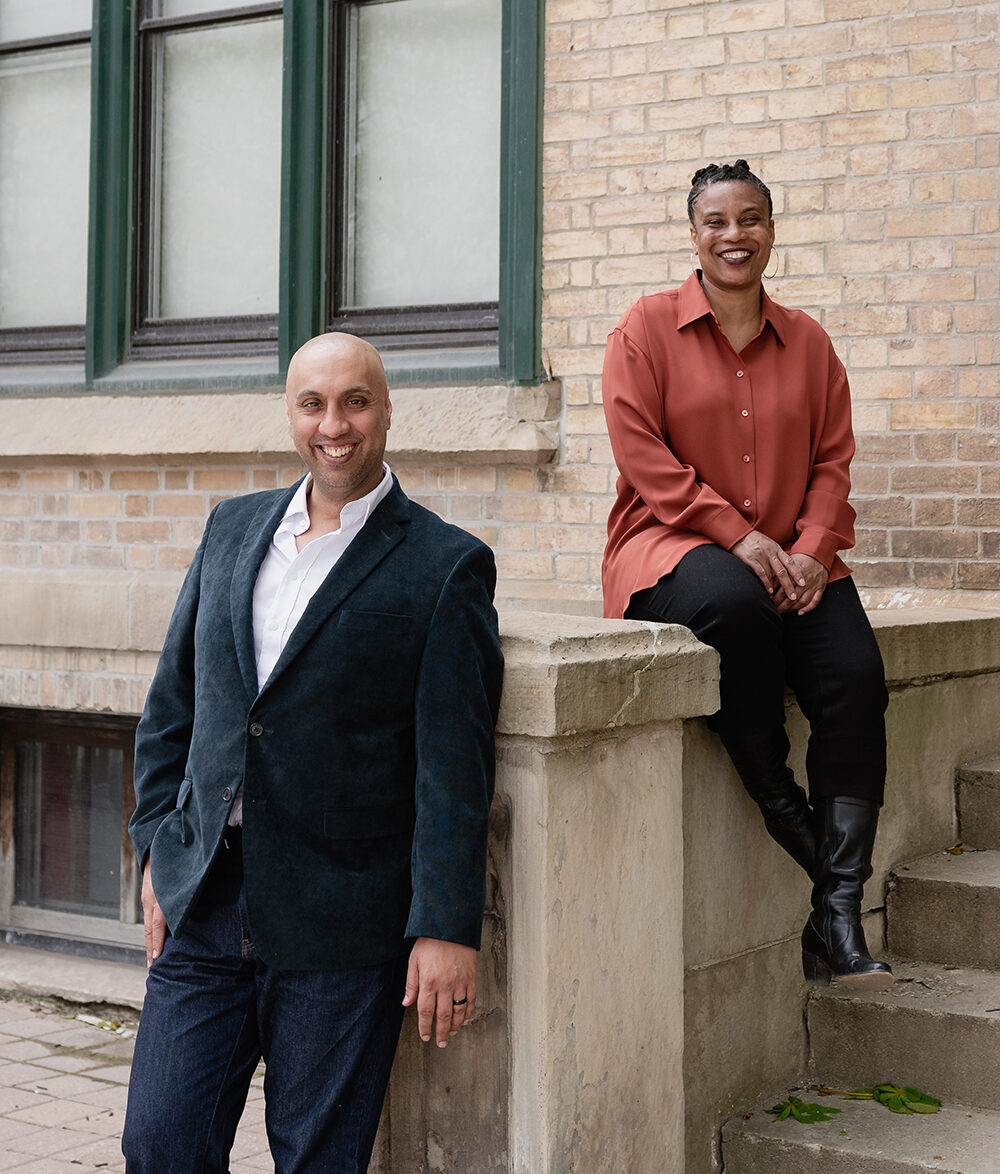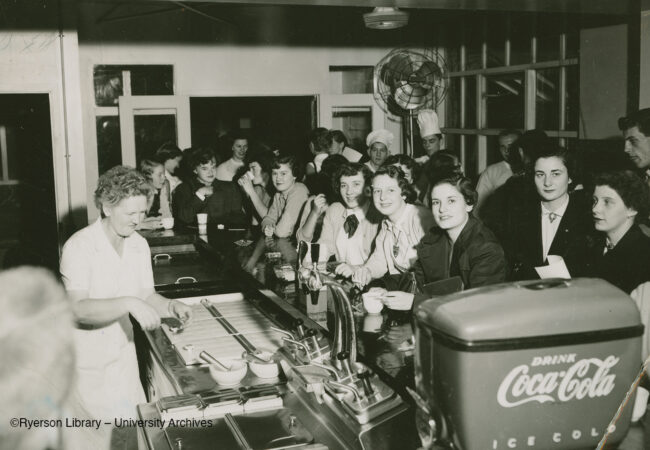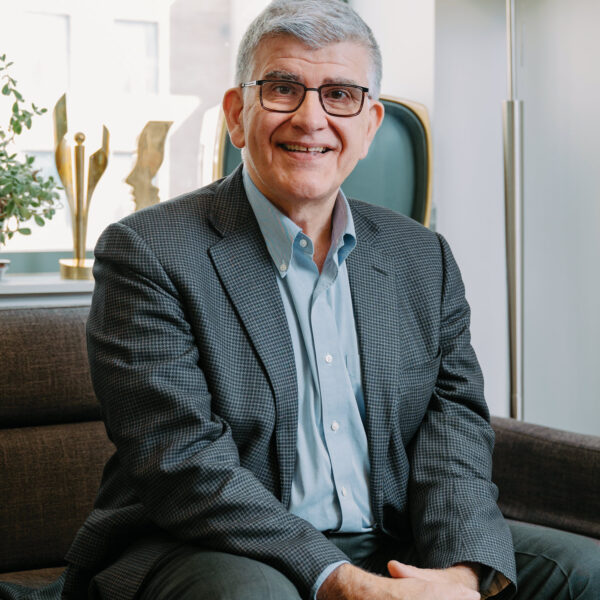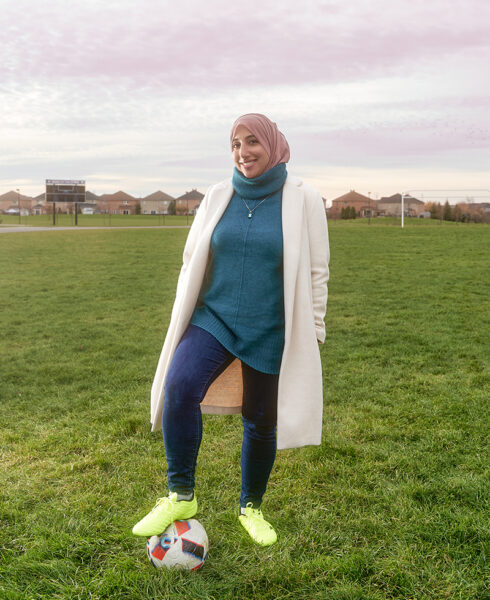Treisha Hylton, Social Work ’04, assistant professor, School of Child and Youth Care
With her undergrad in hand, Treisha Hylton went on to get her master’s degree (York) and PhD (University of Toronto - OISE). In addition to teaching at TMU and several other colleges in Ontario, Hylton has 15 years of professional experience working with various organizations such as Native Child and Family Services, Toronto Catholic District School Board, The Massey Centre and the City of Toronto.
What drew you to teaching?
Teaching is like coaching. I transferred many skills such as patience, creativity and radical caring. Teaching also keeps me learning and unlearning. I am energized when I teach, the way I approach each course is very youth-oriented and social justice oriented. I try to bring the voices and everyday experiences of the Black, Indigenous and racialized communities into conversations each week. It's all relevant to how students will take up their work in the future. Transformative classrooms can change the way we think of pedagogy as liberatory for all involved in education.
Can you tell us about your first day teaching? Were you nervous?
Super nervous, but the classroom remains one of my favorite places to be in. The initial nervousness was combined with excitement and eagerness to engage with students. It has been 11 years since that first teaching position and the classroom remains one of my favourite places in the world.
Who was your favourite teacher/professor at TMU? And why?
Akua Benjamin. She was a Black professor that I came to know in my undergrad year and made me see the possibilities of Black women carving out spaces as professors in higher education. My interaction with her reminds me of what Audre Lorde says: "We must recognize and nurture the creative parts of each other without always understanding what will be created."
What is the most rewarding part of being in the classroom?
I see the possibility and hope and justice through students. The classroom reflects society, it’s a microcosm of the world.
Tell us a bit about your professional life outside of the classroom and how it informs your teaching.
I am a foodie, I love the food scene in Toronto. I love the Raptors because I am an athlete (I played basketball for TMU when I did my undergrad here.) I love our downtown campus and being in the heart of a city. My lived experiences as a Black woman influences the way I teach. I bring that with me into the classroom. I was a social worker in the Catholic School Board and a child protection worker with Native Child as well as a youth court worker - those experiences have contributed a wealth of knowledge.
What have you learned about yourself from your students (or the experience of teaching?)
I consider my students my mentors. They inspire me to do more and create more inclusive spaces and learning environments.
What kind of student were you?
From probation to Dean’s list! I was a poor student until third year—I was even on probation for my first year. I neglected my schoolwork, but I had good professors like Akua whose social work lectures were always on interesting topics. By my fourth year, I was on the Dean’s list.
Can you describe your teaching style?
My identity and teaching philosophy are anchored by a Black Feminist pedagogy, which draws on the oral and written wisdom of Black women’s knowledge production. I draw upon the work of scholars such as Audre Lorde, bell hooks and of ordinary Black women who are surviving, incarcerated, who are queer and trans, who are involved in child welfare, who are grandmothers, continental African women, and diasporic Black women. Their voices bring valuable knowledge. My teaching politics guides me to centre the voices of the most marginalized.
Omar Ha-Redeye, Health Services Management ’05
A few special teachers at critical points helped guide Omar Ha-Redeye’s educational and professional journey. He pays that forward by making a difference in his work as a lawyer and by inspiring his own students over the last 12 years at the university.
How long have you been teaching and what do you teach?
I've been teaching for 12 years now. I teach a wide variety of courses, most of them related to ethics, law, or technology, in the Faculty of Arts, School of Business Management and the new Lincoln Alexander School of Law.
What drew you to teaching?
The transformative experiences I had with teaching is what drew me back to the classroom, as well as the extensive time I've spent in post-secondary environments as a student.
Despite being very smart and performing well in high school, I struggled with motivation and a sense of purpose. In large part I now realize that this was mostly because many of the teachers judged me based on my appearance and my friends at the time, who were not academically inclined at all. These frustrations led to me taking time off from school, and even contemplating not completing my degree. I was fortunate to come across a couple teachers who accurately identified what I was facing, and gave me the push that I needed.
University was an entirely different experience, and I absolutely loved it. My second degree was at TMU, and that was the education that may have made the biggest impact in my career trajectory, specifically because the learning environment was welcome, safe and inclusive, and at the same time pushed us outside of our comfort zones to develop critical thinking.
The impact that my TMU education had on my life is really what drew me to the classroom, in the hopes that I could have a similar effect on even a small number of students. After all these years of teaching, I'm really fortunate to have heard from some students that this goal has been achieved.
Who was your favourite teacher/professor at TMU? And why?
I would have to say it was the late Winston Isaac, though I'm not sure I realized it at the time.
He was the program director at the time, and taught me several classes. When I graduated, I was thinking of doing an MBA or a MPA, but he told me I should go to law school. I looked at him in disbelief, because law school sounded like an incredible ordeal in terms of getting there and finishing the program, but he was insistent that after getting to know me that it was where I belonged.
He was right.
I had all the excuses in the world–that I was too old, already had too many degrees, and that it would cost too much. But he had started out as a respiratory therapist, went on to complete several degrees, including a master’s in Education, an MPA and a PhD, in addition to many other accomplishments, such as Honorary Consul, at the Federation of St. Kitts and Nevis Consulate in Toronto. He was probably the only person who would have been able to convince me to take my TMU education and do even more with it.
What is the most rewarding part of being in the classroom?
The most rewarding part is being able to make a difficult, obscure or complicated topic interesting, even if for a small number of students.
Not everyone really wants to be in a law class. The ones that do will almost always excel. But for some of those who aren't fully engaged, it makes all the difference in the world if you're able to spark curiosity, or simply just make the topic more fun than they thought it would be.
Education is always challenging, especially with a new subject. Bringing that subject to life, using real world examples and practical applications, often makes complex subject matter more digestible, and hopefully even interesting.
Tell us a bit about your professional life outside of the classroom and how it informs your teaching.
Outside of teaching, I am a practising lawyer. Much of my work has involved the unusual intersections of business law and access to justice, which is why the TMU brand fits so nicely with what I do.
A lot of this work has historically included quite a bit of litigation, meaning I am managing files before courts and tribunals. The litigation world in Ontario is different now than it was in generations past, in that the system has been overwhelmed for years, well before the pandemic. The result of that is there are very few trials in the type of work I do, and even fewer jury trials. Teaching in a classroom is one of the best ways to practice explaining legal concepts to a non-lawyer audience, similar to a jury.
Given the constraints of confidentiality and solicitor-client privilege, I can't always discuss or describe the details of cases I've worked on in the classroom. However, what I am able to do is identify trends or issues that I've seen on files, and point to those experiences for students who are learning the subject. That is probably the only place outside of legal practice where I can have those discussions, and so it feels as if the work that I am doing can be built on by others who may do similar work in the future.
What have you learned about yourself from your students (or the experience of teaching?)
I have definitely learned that I cannot make everyone happy, and that I shouldn't try to. But I have also learned that I care deeply about students' success, even if it means they have to take responsibility for achieving those goals.
Teaching has also confirmed for me that there are many talented, highly skilled students who would easily do further studies, start incredible business, or engage in meaningful community organizing, but life responsibilities will often get in the way. Students these days have so many additional pressures, with higher tuition rates, increased cost of living generally, less employment opportunities, and greater competition, and therefore do not always meet their full potential. My hope is that sometimes we can give them that extra push to take on an extra risk, an additional chance on themselves, so that they can see what is truly possible.
Can you describe your teaching style?
I would describe it as fluid, personal and conversational.
I find that some students want and need to be engaged. Those who are willing absolutely love to participate in scenarios and discussions around concepts of the law, but it usually takes them some time to warm up to engage in that manner. What often helps is if I use my own personal examples during the first few classes, to help them develop more of a rapport.
Finally, I would say that rather than reading from a script every class, semester after semester, it's a lot easier for students to understand concepts when it sounds like a conversation. A couple minutes at the start talking about the weather or current events helps set that tone, as can regular check-ins with them about practical tie-ins from the lecture.
Of course all of these approaches have been much more challenging to maintain via Zoom, and many of us (especially the students) seem happy to be back in the classroom.





